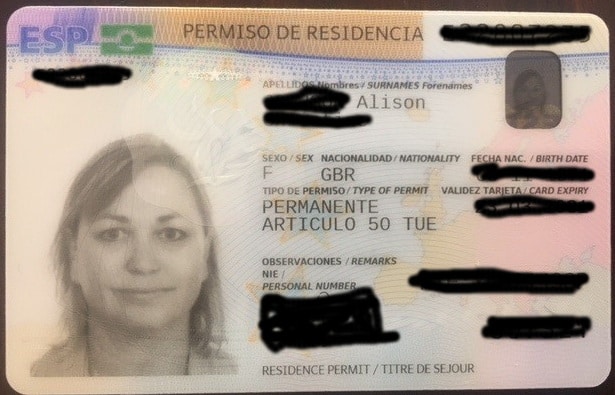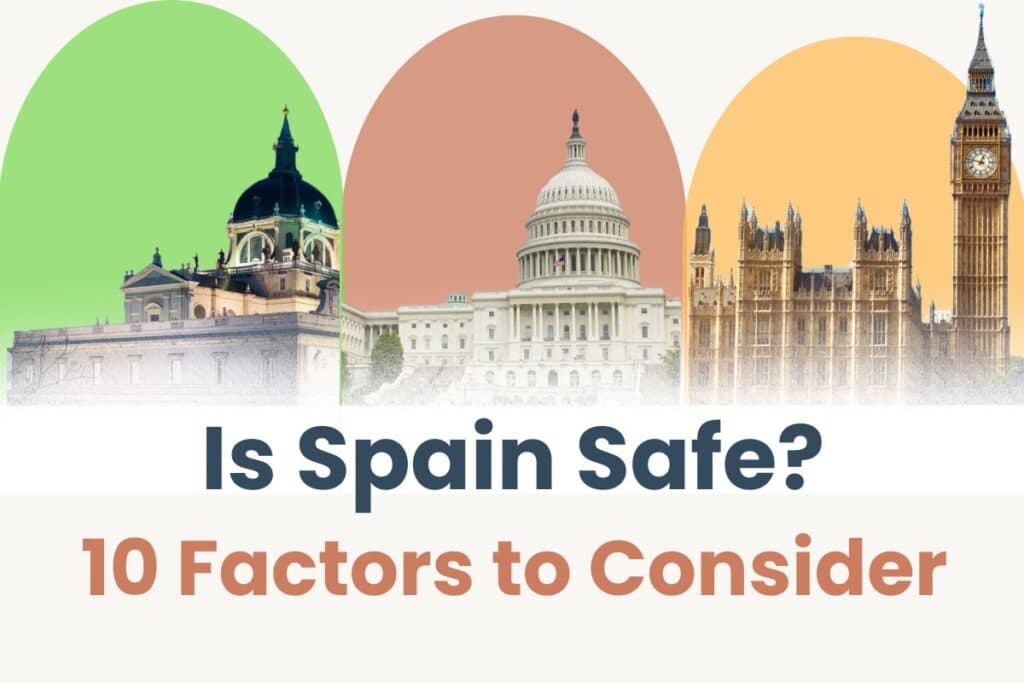When discussing how to get a Spanish residency, we need to start with a quick explanation. We’re talking about legal residency in Spain – this is the right to live in Spain for non-Spanish citizens. We’ll cover residence visas, residence permits, residence cards, and permanent residency in Spain. We’ll also explain how Spanish tax residency differs from legal residency.
Visas vs Residency
These two things get mixed up, and people use the terms interchangeably. It can be very confusing. Here is a simple explanation to help you understand the difference.
- Visa: A visa is a document or authorization that allows you to enter a country for a specific purpose and duration. This is the stamp or sticker the consulate/embassy puts in your passport before you depart.
- Residency: Residency refers to your legal status of living in a country, typically for an extended period. It goes beyond just visiting and involves rights and obligations like working, accessing public services, or studying. Residency can be temporary or permanent and often requires a visa as the initial step.
In summary, a visa is about entry for a specific purpose, while residency is about living in a country with more rights and a longer-term perspective. For example, a non-lucrative visa lets you enter Spain to become a non-lucrative resident with a non-lucrative residence permit.
Spanish Residency Visas
Here are the most common Spanish Residency Visas; these allow you to enter the country with a plan to live in Spain for an extended period. See our guide to Spain Visa Types for more information.
| Residence Visa Type | Residence Permit Duration | Path to PR and Citizenship |
| Employee Work Visa | Initially 1 year, renewable | Yes |
| Non-Lucrative Visa | 1 year, renewable for additional 2-year periods | Yes |
| Student Visa | Duration of study, up to 1 year, renewable | PR only * |
| Family Reunification Visa | Same as the principal visa holder, usually 1 year, renewable | Yes |
| Entrepreneur Visa | 3 years, renewable | Yes |
| Digital Nomad Visa | 3 years, renewable | Yes |
* Only 50% of the time in Spain on a Student Visa counts towards PR, and none counts towards Spanish citizenship qualification.
Remember: Each residence visa has different restrictions and functions. You need to choose the right one to meet the needs of you and your family.
READ ALSO: Spain Work Visa Guide – How to Qualify & Apply
Non-Resident Visas for Spain
These SCHENGEN visas are for short-stays with no intention to remain in Spain.
| Non-Resident Visa Type | Purpose |
| Tourist Visa | Short visits for tourism, up to 90 days. |
| Business Visa | Short-term business trips, conferences, meetings. |
| Short-term Study Visa | Studies, training, or internships less than 3 months. |
| Transit Visa | For passing through Spain to another destination. |
Note: In some cases, you can transfer from a non-resident visa to a residence permit while you are in Spain.
Private Health Insurance for Spanish Residency
Most Spanish residency permits require qualifying private health insurance. The Spanish government has very specific requirements for policies to meet immigration requirements. Our detailed article lets you learn more about Spain’s Private Medical Insurance and residency guidelines. You may need a specialized insurer if you are over 75 or have pre-existing conditions.
Permanent Residency (PR) in Spain
Permanent residence (PR) gives you the right to indefinite residency in Spain as a non-EU citizen. Your permanent resident card only needs to be renewed every five years.
How to Qualify for Permanent Spanish Residency (PR)
1) Legally live in Spain for the qualifying period. In most cases, this is five years (including non-lucrative/retirement residency, residency by investment/golden visa, and digital nomad/startup residency). The only exception is the Spanish student visa, where only 50% of your time in Spain counts. You’d need to have ten years of residency as a student in Spain to apply for PR.
You must reside legally and continuously in Spain for 5 years. Absences in Spain cannot exceed +6 months a year and not +10 months during the 5 years period.
Raquel Moreno – Spanish Residency Expert Immigration Lawyer
Tip: You can find out exactly how much time you have accrued towards PR by visiting your local police station. You can ask for your resident certificate (certificado de residencia), which shows the time that counts towards your PR.
Need help with your Residency paperwork?
If you want to save the hassle of filling out the paperwork correctly, getting all of the appointments yourself, and negotiating the process in Spanish, then we can help you. Our Immigration Partners, Raquel and her team, have helped hundreds of our happy clients.
How to Apply for Permanent Residency in Spain
Once you meet the qualification period, you can submit your application for PR. These are some of the documents you may need for a successful application.
- A completed X-11 Permanent Residence Application form.
- An application fee receipt.
- Your existing temporary residence permit/residence card.
- Proof of qualifying time living in Spain.
- Evidence of sufficient funds to support you and any dependents in Spain.
- Proof of public or private health insurance in Spain.
- Your passport.
- A police certificate showing no criminal record.
At an appointment at your local police station, the police will take an electronic copy of your fingerprints. They’ll issue your TIE (Tarjeta de Identidad de Extranjero), your resident card valid for five years.

Note: If the immigration department rejects your application, you have an appeals process. You typically have one month from the notification date to file an administrative appeal (Recurso de Alzada or Reposición). If this is also rejected, you can file a contentious administrative appeal in the Spanish High Court (Tribunal Superior de Justicia). However, you should always use an experienced immigration lawyer in Spain for this process.
How to Renew Your Permanent Residency Card
Although your residency is permanent, your TIE card is only valid for five years. The replacement process is simple; you are replacing just the card, not an actual residency renewal.
You’ll need to visit your local police station with the following documents.
- A completed X-17 application form.
- Proof of address in Spain, usually your padrón (Certificado de Empadronamiento).
- Original residency card
- Passport
You’ll also electronically resubmit your fingerprints and pay the card replacement fee.
Tip: You should renew the card before its expiry date. So, you should aim to make your appointment with the police station at least three months before the card expires.
European PR – EU Long-Term Resident Status
The official term for EU-wide residency is “Long-Term Resident – EU” status, which is granted under Directive 2003/109/EC. This is commonly referred to as “EU Long-Term Residence Permit” or “EU Long-Term Resident Status.” It allows non-EU nationals who have legally resided in an EU country for at least five years to gain more rights and easier movement within the EU.
Key Features of EU Long-Term Resident Status:
- Granted after five years of continuous legal residence in one EU country.
- Provides stronger protections against deportation.
- Allows easier movement to another EU country for work, study, or family reasons (but still requires an application).
- Recognized by most EU countries (except Denmark and Ireland, which opted out of this directive).
What It’s Not
- It is not the same as EU citizenship.
- It does not automatically let you live and work freely in all EU countries (you must still apply in the new country but get preferential treatment).
- It is not the same as a national permanent residency permit (some countries have their own versions).
Application Process for EU Long-Term Resident Status
If you have legally resided in an EU country for at least five continuous years, you can apply for EU Long-Term Resident Status under Directive 2003/109/EC. The process varies across EU countries, but in Spain, you’ll apply using a form (Modelo EX-11).
PR for EU Citizens in Spain
European Union (EU) and European Economic Area (EEA) citizens can register as Spanish residents without a visa or permit. After five years of living in Spain, they can apply for permanent residence and get a green EU residency certificate, often incorrectly called a “NIE Card”.
Advantages of Permanent Residence in Spain
There are three significant advantages to PR status in Spain.
- Indefinite Stay: Live in Spain indefinitely, with fewer bureaucratic hurdles than temporary visas.
- Work and Study: Freedom to work and study in Spain without restrictions.
- Spanish Citizenship: After five additional years (so ten in total), you can apply for Spanish citizenship by naturalization and an EU passport.
The work and study restrictions apply regardless of your previous residence permit. So, if you transition from a Spanish non-lucrative visa, you can work as soon as you have PR status. Similarly, if you transitioned from a Spain Digital Nomad Visa, you could immediately become a local Spanish company employee.
Legal Residency in Spain vs Tax Residency
Legal residency refers to the right to live in Spain. So, you’ll need a visa (to enter the country) and a residence permit (to stay in the country). Once you have your residence permit, you can get your resident’s card and your official Spanish ID.
Tax residency determines where you pay taxes. You are considered a tax resident in Spain if you meet certain conditions; typically, you live in Spain for more than 183 days a year. You explore becoming a Spanish tax resident in our guide to Expat taxes in Spain.
Important: You can be a legal resident without being a tax resident, and vice versa. For example, if you live in Spain for less than 183 days a year but have a residency permit, you could be a legal resident but not a tax resident. Conversely, if you live in Spain for more than 183 days but don’t have a legal residency permit, you may be a tax resident but not a legal resident.
Are you ready to get Spanish Residency?
How to get residency in Spain can be very confusing. But if you follow the correct administrative steps and processes, it can be done. We recommend using an expert immigration lawyer in Spain to make the process as simple as possible. A good lawyer gives you the best chance of a successful Spanish residency or permanent residency application.
FAQs – Spanish Residency
How can I get residency in Spain?
To get residency in Spain, you must apply for a suitable residency visa based on your circumstances, such as an Employee Work Visa, Non-Lucrative Visa, Student Visa, Golden Visa, Family Reunification Visa, Entrepreneur Visa, or Digital Nomad Visa. After living legally in Spain for the required period (usually five years), you can apply for Permanent Residency (PR).
Can a US citizen get residency in Spain?
Yes, a US citizen can obtain residency in Spain. They must apply for an appropriate Spanish residency visa that aligns with their purpose of stay, such as retirement, work, study, or investment. After fulfilling the necessary requirements, including the duration of stay under the specific visa, they can apply for permanent residency.
How much money do I need to get residency in Spain?
Generally, the financial requirement varies depending on the type of visa. For instance, in 2023, the Non-Lucrative Visa requires €28,800 annual income while the Digital Nomad Visa requires €30,240. It’s advisable to check the latest requirements from official Spanish immigration sources or consult with a Spain immigration lawyer for detailed and up-to-date information.
What is the difference between a visa and residency in Spain?
A visa is a document that allows you to enter Spain for a specific purpose and duration, while residency refers to your legal status of living in Spain, typically for an extended period. Residency involves rights and obligations like working, accessing public services, or studying.
What are the common types of Spanish Residency Visas?
The common types include the Employee Work Visa, Non-Lucrative Visa, Student Visa, Golden Visa (Investor Visa), Family Reunification Visa, Entrepreneur Visa, and Digital Nomad Visa. Each has different durations and paths to Permanent Residency (PR) and citizenship.
How can you qualify for permanent Residency (PR) in Spain?
To qualify for PR, you must live legally in Spain for five years. This includes time spent under various visas, such as non-lucrative/retirement residency, residency by investment/golden visa, and digital nomad/startup residency. For Spain student visas, only 50% of the time counts towards PR.
What are the advantages of having Permanent Residence in Spain?
The advantages include the right to live in Spain indefinitely with fewer bureaucratic hurdles, the freedom to work and study in Spain without restrictions, and the eligibility to apply for Spanish citizenship and an EU passport after an additional five years.
Can I get residency in Spain if I buy a house?
Yes, the Spain Golden Visa (or Investment Visa) offers residency to anyone buying real estate in Spain worth more than €500,000. Once you have purchased the property, you can apply for your Spain residency by investment permit and live and work in Spain.









Useful and helpful message. Appreciate.